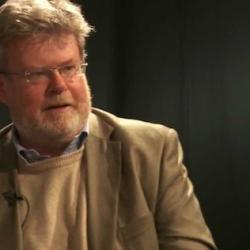Lambert Zuidervaart’s essay on “radical Augustinian social critique” is, of course, mainly about Radical Orthodoxy. He devotes several pages to Graham Ward and John Milbank, highlighting the power of their work but offering some criticisms.
He disputes Milbank’s notion that the church is a “society,” claiming that this confuses church and kingdom. He also questions Milbank’s diagnosis of Western secularism as a failure of the church being church. He quotes Milbank’s claim that “Either the Church enacts the vision of paradisal community . . . or else it promotes a hellish society beyond any terrors known to antiquity . . . For the Christian interruption of history ‘decoded’ antique virtue, yet thereby helped unleash first liberalism and then nihlism” (232).
Zuidervaart asks, “was ‘the Christian interruption’ really all that powerful? Did not other factors play an equal role, including economic, technological, and political forces that were not simply intellectual or ethical?” If I’m understanding Milbank, he’s talking about the “Christian interruption” of incarnation and resurrection. I have to assume that Zuidervaart is responding to something else, perhaps to some claim about the church detached from Christ’s work (as if the “Christian interruption” = the church as a sociological reality). If that’s what Zuidervaart disputes, I believe he’s missed Milbank’s point. If he is responding to what I take to be Milbank’s actual point, then it seems Zuidervaart is claiming that the events of the gospel are no more decisive for history than economic, political, or technical forces. And that leaves one rather dumbfounded.
Zuidervaart further claims that Ward and Milbank locate “the source of societal goodness in an ideal pattern that lies outside human history” (232). This is perhaps a comment on the Platonism of Radical Orthodoxy; if it’s a comment on the eschatological orientation of Augustinian social critique, I don’t think it counts as a criticism. The ideal pattern for societal goodness does lie outside human history (or, pre-eschatological human history), because the ideal pattern is a city that is yet to come.
Zuidervaart recognizes Ward and Milbank find this ideal pattern is found in “certain practices developed within an ecclesial community,” in particular “the celebration of the Eucharist.” This leaves Radical Orthodoxy with “few theoretical resources with which to make nuanced judgments about better or worse tendencies. By emphasizing that all cities should be cities of the good, it has little to say about what makes specific cities relatively good. . . . we are left, for the most part, with abstract norms that have little historical effect and historical developments little normative promise: either a city of the good, but no good cities, or potentially good cities that are never good enough” (233). This isn’t entirely fair, but it’s fair enough to hit home.
And here I would suggest that Radical Orthodoxy’s liturgically-centered social model and social critique (which I find compelling) can be enhanced by a Protestant emphasis on the Word. The eucharist is a social model, and provides a base for social critique, but that model and critique take on the nuanced specificity that Zuidervaart rightly asks for when the Eucharistic liturgy is also a liturgy of the Word, when the Bible is on the table with the bread and wine.















